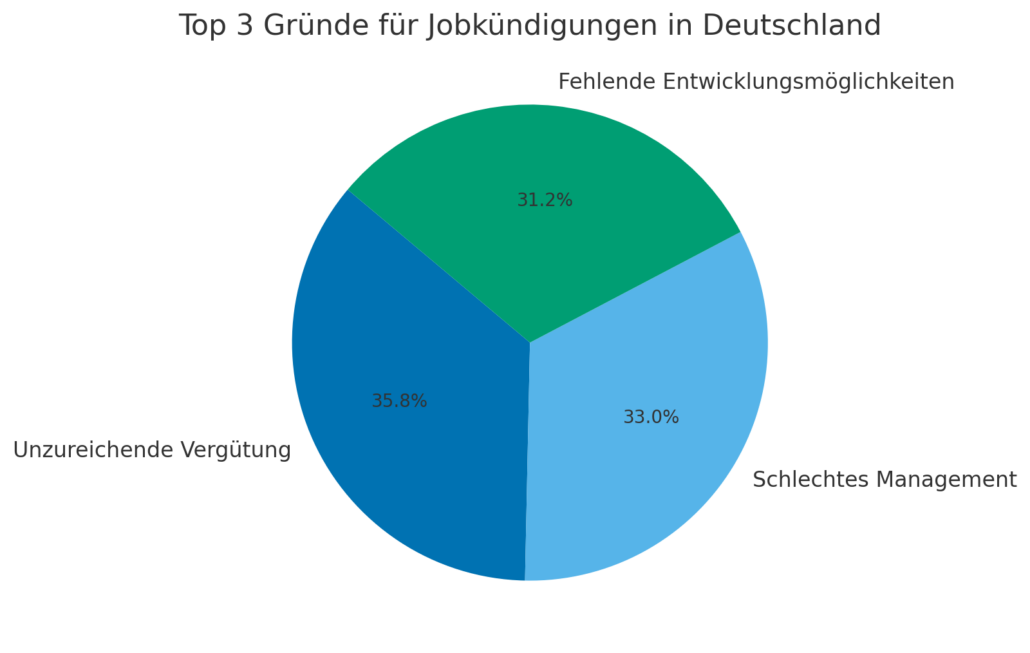7 red flags in the application process: how to recognize toxic companies and protect your career
The application process and especially the interview are not only a good opportunity to show your best side – the company should also be thoroughly examined at this point. After all, you want to find a job that fulfills you and helps you progress, rather than causing you frustration and disappointment, right?
Choosing the right job is crucial for your satisfaction and professional development. That’s why we show you the most important “red flags” (warning signs) that indicate potential problems or toxic professional situations. You should recognize these in the job interview. You will also receive practical tips on how to avoid pitfalls at an early stage and prevent nasty surprises in the job.
7 red flags in the application process
Even during the application process, there are often initial indications that a company may not be the ideal employer you first thought it was. Pay particular attention to the following aspects:
1. fast pace and unclear information about the role
If the company is pushing hard and would like to hire you immediately, you should be careful. If the information about the position or your tasks is kept vague, this often indicates that the company itself does not yet know exactly who it is looking for.
Why is this important? An undefined area of responsibility and hasty recruitment can be signs of staff shortages or high staff turnover – neither of which are ideal starting conditions.
Tip: Make sure that your questions about the role are answered precisely and transparently. A good company will also give you time to make your decision in peace.
2. little openness regarding salary and working conditions
“We’ll discuss salary and working hours later” – a sentence that is rarely a good sign. A transparent employer should offer clarity about salary, overtime regulations and extras such as working from home right from the start.
Why is this important? If the company avoids this, it could be an indication of unfavorable working conditions.
Tip: Ask specific questions and make sure the answers are clear and direct – this shows that the company values transparency.
3. poor ratings and high fluctuation
Platforms such as kununu or Glassdoor allow you to take an honest look behind the scenes of the company. An accumulation of negative reviews or frequent employee turnover can indicate problems in the corporate culture.
Why is this important? High turnover and poor evaluations indicate a stressful work environment that can be characterized by constant changeovers.
A stressful working environment, which can be characterized by constant change, is covered in detail in the Business Psychology course. Here you will learn how corporate culture and employee management can be positively influenced.
Tip: Take the time to read reviews and pay attention to recurring points of criticism such as a lack of work-life balance or management problems – this can save you frustration later on.
Recognizing red flags in the job interview
Especially in the interview, when you speak directly to a future supervisor, you can quickly identify some critical points:
4. unpunctual or unprepared interviewer
If your interviewer is late or seems unprepared, this does not speak for an appreciative corporate culture. Snide comments or questions that have nothing to do with the job are also warning signs.
Why is this important? The interview gives you a small insight into the corporate culture. If little respect is shown here, this could be problematic in everyday working life.
Tip: Pay attention to how seriously the person you are talking to takes you and how professional the conversation is. Even small signs reveal a lot about how you treat each other.
Also prepare well and ask specific questions yourself. In our article“A successful start to your career: the 14 most important questions in a job interview”
you will find helpful questions that you can use to find out more about the corporate culture and everyday working life – so you are well prepared for the interview.
5. high expectations and unpaid tasks
If high demands are made in the interview or unpaid tasks are requested without the prospect of employment, this indicates one-sided expectations.
Why is this important? High demands without appropriate recognition can lead to excessive demands and frustration.
Tip: Be careful when high expectations are set without clear consideration or prospects. Your time and energy should not be wasted here.
6. vague career and further training prospects
A good employer provides clear answers about career paths and further training opportunities. If these answers remain vague, this could indicate that the focus is not on employee development.
Why is this important? Without clear prospects, you risk stalling your career.
Tip: Ask specifically about development opportunities. Companies that are interested in you in the long term have no need for excuses.
If you want to develop professionally and learn more about such topics, then take a look at the part-time MBA program – it prepares you optimally for responsible and leading roles.
7. constant emphasis on “dynamics” and “challenges”
If the company places a lot of emphasis on “dynamism” and “challenges”, you should pay attention. This often conceals a stressful and unstable environment.
Why is this important? A challenging work environment can be exciting, but often leads to stress and frustration if there is no balance.
Tip: Ask how the company supports its employees when they face challenges. This will tell you whether the team sticks together or whether everyone is on their own.
Why you should pay attention to red flags in the application process
Many resignations could be avoided if you pay attention to red flags during the application process. This not only saves time and nerves, but also protects you from making a decision you later regret.

Source: Own presentation based on McKinsey Survey 2023, Germany, survey with N=1,286 participants
A recent survey by McKinsey of 1,286 employees in Germany shows that the most common reasons for resignation are insufficient remuneration (39%), dissatisfaction with managers (36%) and a lack of development and training opportunities (34%). These figures illustrate how important it is to ensure clear prospects and fair conditions.
Conclusion: Watch out for these red flags – it’s worth it!
Looking at these warning signs will help you gain clarity about the corporate culture and potential problems within the company. Every question you ask and every detail you notice will bring you closer to a job that really suits you. This will save you disappointment and give you confidence in your career.
Fancy more career tips? Then sign up for our monthly newsletter or check out our TikTok account! There you will regularly find exciting content and hacks to help you on your career path.





